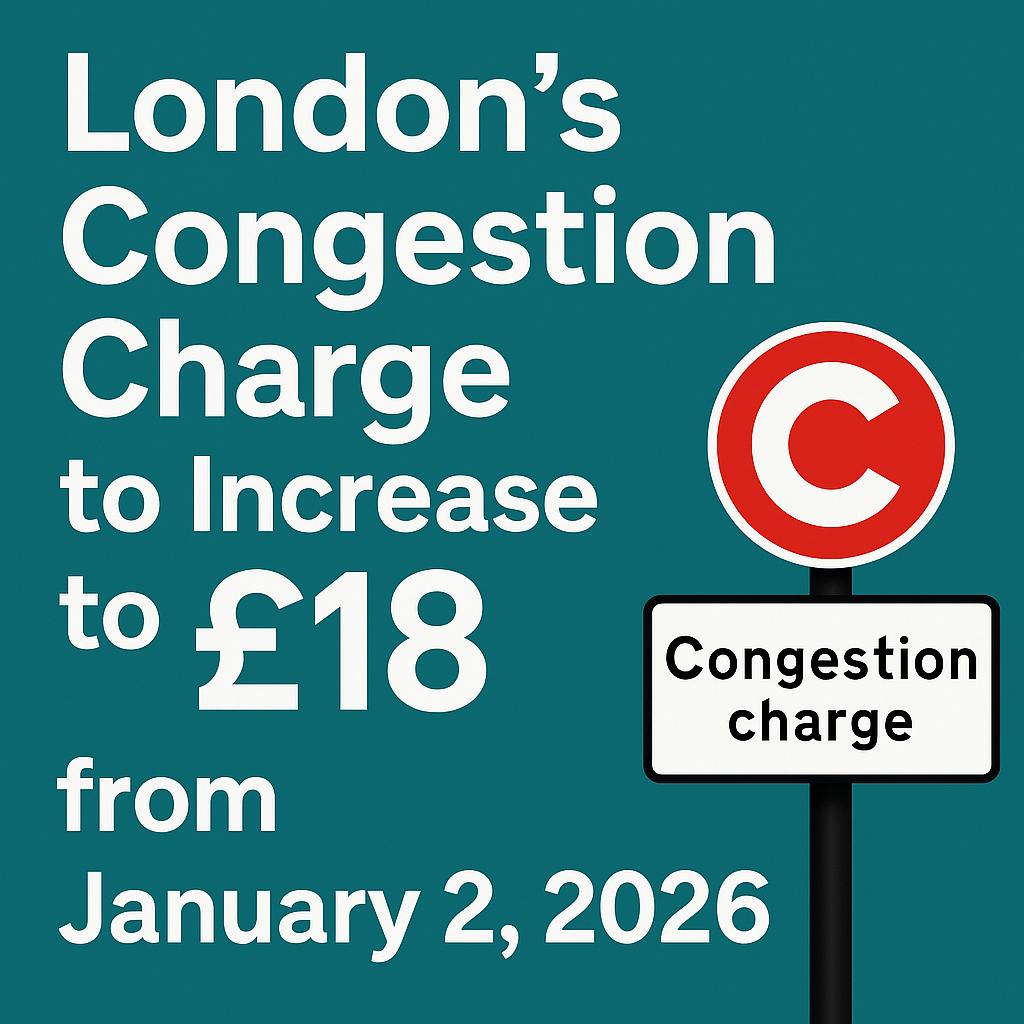London’s Congestion Charge Set to Rise to £18: Public Concerns Mount Over Equity and Effectiveness
Transport for London (TfL) has announced plans to increase the daily Congestion Charge from £15 to £18 starting January 2026. This proposal, currently under public consultation, also includes provisions for annual incremental increases tied to inflation and fare adjustments. This marks the first rise since 2020 and is part of a broader initiative to manage traffic congestion and promote sustainable travel in central London.
The Congestion Charge, introduced in 2003, aims to reduce traffic congestion and promote sustainable travel in central London. TfL asserts that the proposed increase will further these goals by encouraging the adoption of electric vehicles (EVs) and public transport. To support this transition, TfL plans to offer discounts for EVs: a 25% discount for electric cars and a 50% discount for electric vans and heavy goods vehicles registered for Auto Pay.
However, the proposed hike has sparked significant public concern. Critics argue that the increased charge disproportionately affects lower-income individuals who rely on personal vehicles for commuting, especially those without viable public transport alternatives. Small businesses operating within the congestion zone express worries about the financial strain of higher delivery and operational costs, potentially leading to increased prices for consumers.
Moreover, some residents question the efficacy of the Congestion Charge in alleviating traffic congestion. Despite its implementation over two decades ago, London remains one of Europe's most congested cities, with drivers spending an average of 101 hours in traffic annually.
TfL's public consultation on the proposed changes is ongoing, inviting feedback from residents, businesses, and other stakeholders. As the city grapples with balancing environmental objectives and economic equity, the outcome of this consultation will be pivotal in shaping London's transportation landscape.
Key Changes and Their Implications
1. Increased Daily Charge
The proposed £3 increase aims to maintain the deterrent effect of the charge amidst rising inflation. TfL estimates that without this adjustment, an additional 2,200 vehicles would enter the Congestion Charge Zone (CCZ) daily during charging hours.
2. Adjustments to Electric Vehicle (EV) Discounts
Currently, electric vehicles benefit from a 100% discount on the Congestion Charge. However, starting December 25, 2025, this exemption will end. From January 2026, EV drivers registered for Auto Pay will receive a 25% discount, reducing the daily charge to £13.50. Heavy goods vehicles (HGVs) and certain other electric vehicles will receive a 50% discount.
3. Changes to Residents' Discount
TfL plans to modify the Residents' Discount scheme, particularly affecting new applicants. Details are under consultation, but the aim is to align resident incentives with broader environmental goals.
Public Response and Criticism
The proposed increase has elicited mixed reactions:
-
Economic Impact on Businesses: Business groups express concern that the hike will strain small enterprises already facing financial challenges, potentially leading to increased operational costs
Effectiveness in Reducing Congestion: Despite the Congestion Charge's intent, London remains Europe's most congested city, with drivers spending an average of 101 hours in traffic annually.
Equity Concerns: Critics argue that the charge disproportionately affects lower-income individuals who may lack viable public transport alternatives. Implications for Drivers and Leasing

Implications for Drivers and Leasing
For Individual Drivers:
-
Increased Costs: Regular commuters into the CCZ will face higher daily expenses, prompting some to reconsider travel habits or vehicle choices.
Shift Towards EVs: While EVs will no longer be exempt, the discounted rate may still incentivize a transition to electric vehicles.
For Leasing Customers:
-
Business Leasing: Companies operating within or near the CCZ might explore leasing EVs to benefit from the available discounts, aligning with sustainability goals and managing costs.
-
Personal Leasing: Individuals may consider leasing EVs to mitigate the impact of the increased charge, especially if commuting regularly into central London.
Navigating the Changes
As the landscape evolves, drivers and businesses must assess their options:
-
Evaluate Travel Needs: Determine the frequency of travel into the CCZ and assess whether alternative routes or modes of transport are viable.
Consider Vehicle Choices: Explore leasing options for EVs or other low-emission vehicles that may offer cost savings in the long term.
Stay Informed: Participate in TfL's public consultation, open until August 4, 2025, to voice opinions and stay updated on final decisions
For more information on leasing options and navigating these changes, Pendle Lease is here to assist with tailored solutions to meet your needs.